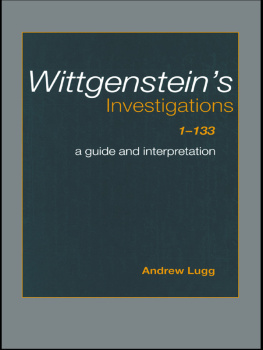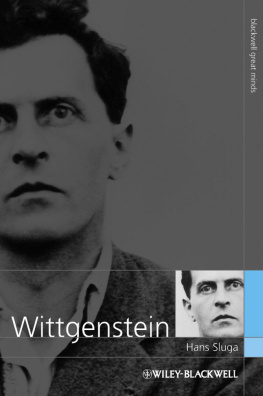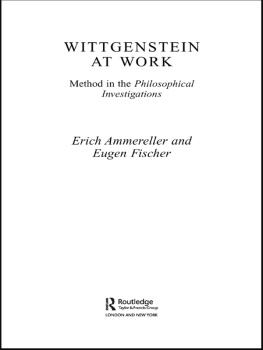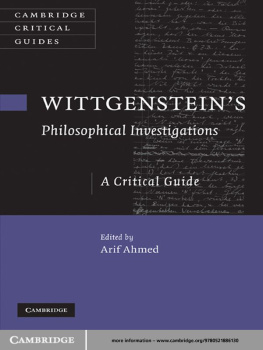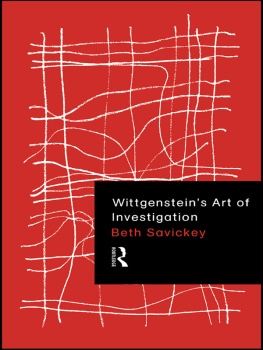Lugg - Wittgensteins investigations 1-133 a guide and interpretation
Here you can read online Lugg - Wittgensteins investigations 1-133 a guide and interpretation full text of the book (entire story) in english for free. Download pdf and epub, get meaning, cover and reviews about this ebook. City: London;New York, year: 2000;2011, publisher: Routledge, genre: Children. Description of the work, (preface) as well as reviews are available. Best literature library LitArk.com created for fans of good reading and offers a wide selection of genres:
Romance novel
Science fiction
Adventure
Detective
Science
History
Home and family
Prose
Art
Politics
Computer
Non-fiction
Religion
Business
Children
Humor
Choose a favorite category and find really read worthwhile books. Enjoy immersion in the world of imagination, feel the emotions of the characters or learn something new for yourself, make an fascinating discovery.
Wittgensteins investigations 1-133 a guide and interpretation: summary, description and annotation
We offer to read an annotation, description, summary or preface (depends on what the author of the book "Wittgensteins investigations 1-133 a guide and interpretation" wrote himself). If you haven't found the necessary information about the book — write in the comments, we will try to find it.
Lugg: author's other books
Who wrote Wittgensteins investigations 1-133 a guide and interpretation? Find out the surname, the name of the author of the book and a list of all author's works by series.
Wittgensteins investigations 1-133 a guide and interpretation — read online for free the complete book (whole text) full work
Below is the text of the book, divided by pages. System saving the place of the last page read, allows you to conveniently read the book "Wittgensteins investigations 1-133 a guide and interpretation" online for free, without having to search again every time where you left off. Put a bookmark, and you can go to the page where you finished reading at any time.
Font size:
Interval:
Bookmark:
It is a genuinely important bookthere is nothing I know of in print which goes into such sophisticated detail as Lugg in getting Wittgenstein right.
Burton Dreben, Harvard and Boston Universities
One of the greatest works of twentieth-century philosophy, Ludwig Wittgensteins Philosophical Investigations is also one of the most controversial. Wittgensteins Investigations 1133 provides a clear and concise introduction to the crucial early sections of this classic work.
Andrew Lugg discusses in detail what Wittgenstein says about meaning, metaphysics and philosophy in sections 1133 of the Philosophical Investigations. Besides making Wittgensteins thought accessible to a general audience and explaining its philosophical significance, the book develops a radical interpretation of his remarks. It takes Wittgensteins text to epitomize his philosophical outlook and applies Wittgensteins philosophical strategy to his own words.
Wittgensteins Investigations 1133 will be a valuable resource for anyone interested in Wittgenstein, language and the history of twentieth century philosophy.
Andrew Lugg is Professor of Philosophy at the University of Ottawa.
For Lynne Cohen, fellow traveller and partner for the best part of a lifetime.

London and New York
First published 2000
by Routledge
11 New Fetter Lane, London EC4P 4EE
Simultaneously published in the USA and Canada
by Routledge
29 West 35th Street, New York, NY 10001
Routledge is an imprint of the Taylor & Francis Group
This edition published in the Taylor & Francis e-Library, 2003.
2000 Andrew Lugg
All rights reserved. No part of this book may be reprinted or reproduced or utilized in any form or by any electronic, mechanical, or other means, now known or hereafter invented, including photocopying and recording, or in any information storage or retrieval system, without permission in writing from the publishers.
British Library Cataloguing in Publication Data
A catalogue record for this book is available from the British Library
Library of Congress Cataloging-in-Publication Data
Lugg, Andrew
Wittgensteins investigations 1133: a guide and interpretation/Andrew Lugg.
p. cm.
Includes index.
1. Wittgenstein, Ludwig, 18891951. Philosophische Untersuchungen.
1133. 2. Meaning (Philosophy). 3. Metaphysics. 4. Philosophy.
I. Title: Wittgensteins investigations one through one hundred thirty-three.
II. Title.
B3376.W563 P529 2000
192dc21
99089678
ISBN 0-203-46757-4 Master e-book ISBN
ISBN 0-203-77581-3 (Adobe eReader Format)
ISBN 0-415-23245-7 (Print Edition)
Ludwig Wittgenstein is mainly known for two great works of philosophy, the Tractatus Logico-Philosophicus, published in 1921, and the Philosophical Investigations, published posthumously in 1953. In the earlier work Wittgenstein purports to solve all the problems of philosophy; in the later work he rethinks some of the same problems and explores issues that he had previously overlooked, failed to appreciate properly or dismissed as unimportant. Though just as ambitious as the Tractatus, the Investigations is very different in form and spirit. It too deals with central problems of philosophy, but it is not as abstract or dogmatic. Here Wittgenstein does greater justice to the appeal and depth of past philosophy and devotes much more time and effort to exposing and confronting the grip of philosophical ideas on our thinking.
The first 133 sections of the Investigations, the subject of the present work, deal with topics central to Wittgensteins later philosophy. They are some of the most carefully worked out sections of the book, and had Wittgenstein written nothing else they would still merit our attention. The philosophy of the rest of the Investigations is also of the highest order, but 1133, which constitute about a fifth of the book, deserve special attention (and are more than enough to consider in a single volume). Also 134142 are somewhat technical, and at 143 Wittgenstein embarks on a more detailed examination of a variety of issues, some of which are touched on in the sections we shall be considering. It is not by chance that 1133 deal with the themes they do; Wittgenstein took what he says here to be fundamental for what he was trying to achieve in the Investigations and elsewhere.
My discussion is in the form of a commentary. I go through 1133 a paragraph at a time, sometimes even line by line, and relegate discussion of how the text should be understood to interspersed interludes. Wittgensteins remarks are exceptionally compressed, and it is easy to misconstrue what he is saying if one allows oneself the liberty of skipping from section to section and disregards how they are arranged. Few authors were more reluctant to go into detail than Wittgenstein, and the further we stray from the text, the more likely we are to misconstrue him. While reading the Investigations from the beginning is not a panacea, it is a useful antidote to common misinterpretations of what he is saying. Half the battle, it seems to me, is to refrain from trying to make his remarks more perspicuous by reorganizing them and to avoid assuming he intended us to fill what appear to be gaps in his exposition in this or that particular way (or at all). Instead of regarding the Investigations as an arcane document that can be understood only by imposing an interpretation on it, we should try to meet it on its own terms and struggle to figure out what each of its sentences actually says.
I have three main goals. First to provide a clear and concise introduction to 1133 of the Investigations, one accessible to those unfamiliar with Wittgensteins philosophy. Secondly to remedy what I take to be mistaken ways in which individual sections are often read. And thirdly to draw attention to what, for want of a better phrase, might be called Wittgensteins philosophical outlook. I believe it possible to do all three things at once since I believe what Wittgenstein is trying to say is best appreciated by working through his text from the beginning. In fact I am persuaded that the power and importance of the Investigations becomes clear only when it is studied section by section in the order Wittgenstein intended. To understand him one has to follow the trail he pioneers and explore the issues he takes up along with him. Grappling with the text is not one option among many, never mind a first step towards a philosophically more sophisticated account of Wittgensteins remarks. It is the only way to grasp what he is trying to convey.
My strategy in what follows is somewhat similar to Wittgensteins own strategy. Just as Wittgenstein labours to clear away what he takes to be misleading ways of thinking about the world and our place in it, so I bend my energies to clearing away misleading ways of reading his text. In Wittgensteins view we are led for a variety of reasons to see things other than they are, and I believe we are swayed by equally extraneous factors to regard him as saying something he does not say. Also in much the same way as Wittgenstein attempts to get us to see what is in front of our very eyes, I try to get us to read the words on the page. In my opinion the Investigations has to be appreciated in the spirit of Wittgenstein himself, and we must resist the temptation to overinterpret and overstructure his remarks. At any rate the reader should bear in mind that I intend to apply what I take to be a central lesson of Wittgensteins philosophy to his own writing.
Font size:
Interval:
Bookmark:
Similar books «Wittgensteins investigations 1-133 a guide and interpretation»
Look at similar books to Wittgensteins investigations 1-133 a guide and interpretation. We have selected literature similar in name and meaning in the hope of providing readers with more options to find new, interesting, not yet read works.
Discussion, reviews of the book Wittgensteins investigations 1-133 a guide and interpretation and just readers' own opinions. Leave your comments, write what you think about the work, its meaning or the main characters. Specify what exactly you liked and what you didn't like, and why you think so.

